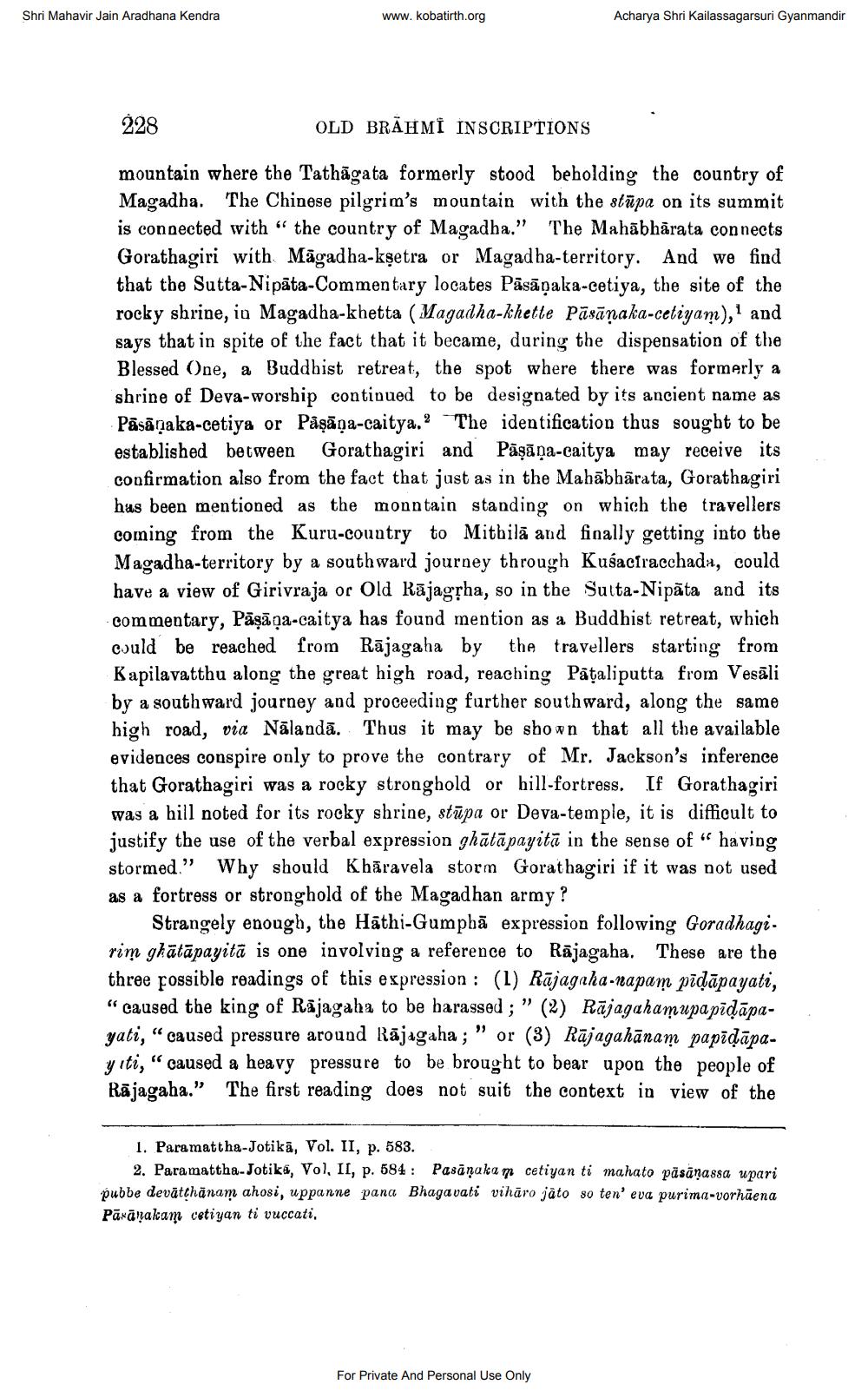________________
Shri Mahavir Jain Aradhana Kendra
www.kobatirth.org
Acharya Shri Kailassagarsuri Gyanmandir
228
OLD BRAHMI INSCRIPTIONS
mountain where the Tathagata formerly stood beholding the country of Magadha. The Chinese pilgrim's mountain with the stupa on its summit is connected with "the country of Magadha." The Mahabharata connects Gorathagiri with Magadha-kṣetra or Magadha-territory. And we find that the Sutta-Nipata-Commentary locates Pasāṇaka-cetiya, the site of the rocky shrine, in Magadha-khetta (Magadha-khette Pāsāṇaka-cetiyam),1 and says that in spite of the fact that it became, during the dispensation of the Blessed One, a Buddhist retreat, the spot where there was formerly a shrine of Deva-worship continued to be designated by its ancient name as Pasānaka-cetiya or Paṣaṇa-caitya." The identification thus sought to be established between Gorathagiri and Paṣaṇa-caitya may receive its confirmation also from the fact that just as in the Mahabharata, Gorathagiri has been mentioned as the monntain standing on which the travellers coming from the Kuru-country to Mithila and finally getting into the Magadha-territory by a southward journey through Kusacfracchada, could have a view of Girivraja or Old Rajagṛha, so in the Sutta-Nipata and its commentary, Pasaga-caitya has found mention as a Buddhist retreat, which could be reached from Rajagaha by the travellers starting from Kapilavatthu along the great high road, reaching Pataliputta from Vesali by a southward journey and proceeding further southward, along the same high road, via Nalanda. Thus it may be shown that all the available evidences conspire only to prove the contrary of Mr. Jackson's inference that Gorathagiri was a rocky stronghold or hill-fortress. If Gorathagiri was a hill noted for its rocky shrine, stupa or Deva-temple, it is difficult to justify the use of the verbal expression ghātāpayita in the sense of " having stormed." Why should Kharavela storm Gorathagiri if it was not used as a fortress or stronghold of the Magadhan army?
Strangely enough, the Hathi-Gumpha expression following Goradhagirim ghatapayita is one involving a reference to Rajagaha. These are the three possible readings of this expression: (1) Rajagaha-napam piḍāpayati, "caused the king of Rajagaha to be harassed; " (2) Rajagahamupapīḍāpayati, "caused pressure around Rajagaha; or (3) Rajagahanam papīḍāpayiti, " caused a heavy pressure to be brought to bear upon the people of Rajagaha." The first reading does not suit the context in view of the
99
1. Paramattha-Jotikā, Vol. II, p. 583.
2. Paramattha-Jotika, Vol. II, p. 584: Pasānakam cetiyan ti mahato päsanassa upari pubbe devātṭhānam ahosi, uppanne pana Bhagavati viharo jato so ten' eva purima-vorhäena Pārāṇakam cetiyan ti vuccati,
For Private And Personal Use Only




